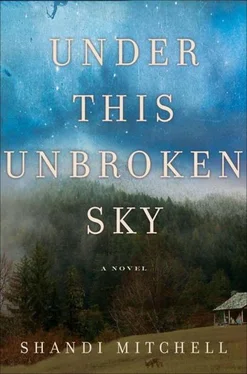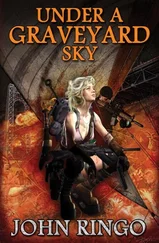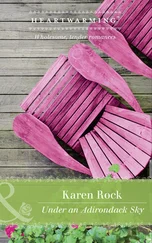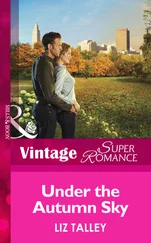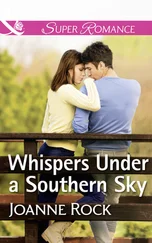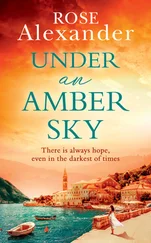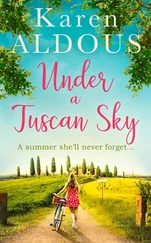Ivan and Petro erect a three-foot-high fence around the garden, a weaving of willow branches and spruce poles to protect from deer. Ivan has been entrusted with the ax and proudly walks around the two-inch saplings, picking the right spot to chop. Petro’s talent is weaving the willows into fine arching trellises or bowing them in a delicate cross-hatch that lets in just the right amount of light.
Little Katya’s job is making cardboard signs to identify the crop. She writes in delicate swirls first the Ukrainian name, followed by the English: chasnyk garlic, kapusta cabbage, kartoplia potato, ohirok cucumber. Maria doesn’t like the English words, and when the children try to make her pronounce them, they laugh uproariously at her stumbling tongue. It is bad enough the children are forced to speak English in school, but at home she insists they speak their mother tongue. Even so, the languages have begun to cross-pollinate, creating hybrids she no longer recognizes, in which the English strain overpowers the beauty and nuance of the original. The youngest often mix the two languages together, and when Maria demands that Ivan speak properly, he becomes confused and has to search his mind for the right Ukrainian words, and he hasn’t even started school yet.
Sofia tells Katya in English that their mother can’t learn the words because she is too old and too Ukrainian. She’ll never be a real Canadian. By their covert glances and Katya’s guilty face, Maria knows they are talking about her, but when she asks they claim to be discussing how deep to plant the seeds.
Sofia practices her English pronunciations endlessly, trying to eradicate the last vestiges of a Slavic accent. She recites “A is for apple, B is for bed, C is for cat…” and her favorite, saddest poem that she learned in school, “Lucy” by William Wordsworth, about a peasant girl “fair as a star… whom there were none to praise and very few to love,” who lived and died unknown.
By the end of the poem, her eyes water, knowing that she could be Lucy, here with the dirt spoiling her skirt and sullying her hands, stooped over a row of parsnips. But unlike Lucy, there will be no one to mourn her, no one to write a poem for her… she will be forgotten. This tragic thought starts her reciting again, until Maria snaps, “Speak properly!” and Sofia chooses silence instead.
Sometimes, when she is alone milking the cow, Maria tries to say the words her children teach her. Mil-ik, co-ow, milikingk co-ow. But even to her ear, the words sound harsh and awkward. Korova is a much prettier word. Teodor can speak English, and the rest of her family is rapidly adapting to its flat sounds and colorless rhythm. Only Dania seems to prefer using simple, garden-variety Ukrainian. Maria knows the children need to adapt in order to grow in this land, but she will never allow them to forget their roots. So Katya writes both words on the signs. Maria doesn’t understand the heated discussions when Sofia points out misspellings such as skwash and onyions .
It is Sofia’s and Lesya’s job to haul buckets of water from the well, which is downhill from the house. Despite Lesya’s crooked foot, she always returns first with two buckets yoked across her shoulders while Sofia lags behind arriving with only half a bucket, having slopped away the rest. She always has excuses: she tripped, a bee chased her, the bucket leaked, it was too heavy… Maria sends her back for another.
Sofia stomps off, hurling the bucket as soon as she is out of sight of her mother. Lesya hobbles after her in a vain attempt to alleviate her cousin’s punishment, remaining silent while Sofia rants that she will never be a farmer’s wife. She’s going to live in the city in a proper house with an indoor toilet and electricity; she’ll be a famous actress and people will shower her with chocolate and new dresses. Next summer, when she turns twelve, she’ll get out of this goddamned place. She blends the two words together like her English friends, so they roll off her tongue as one, goddamned , the only English word in a tirade of Ukrainian.
Lesya is just happy to be with her aunt and cousins instead of inside the house with her mother. She doesn’t think about her father. At night lying in bed wrapped in the sour smell of dirty sheets, scratching at bedbugs and lice, with Anna pacing the floor, Lesya wonders what it would be like to be Teodor and Maria’s child. Maria never looks at Lesya like she is a cripple, she never gives her chores that are easier. She knows Lesya will figure out a way to do the work. They look at her like she is normal.
Lesya and Petro eat lunch and supper at their aunt’s house, even though they can barely all fit into what used to be the storage shed; it feels more like a house than their own. Crammed around the table, elbows and knees touching, laughing at Sofia’s performances and Ivan’s knock-knock jokes, it feels like a family. They bathe with their cousins and sometimes Maria washes their clothes. They listen attentively to her stories from the old country. Sometimes while they work, Maria asks Lesya to sing. She starts shyly, the notes growing stronger, lifting skyward as she forgets her audience and sings for the dirt, the sun, the spider, and the curious magpie. At the end of each song, Maria thanks her. Diakuiu, she says in the same low voice that she says Amin’.
After lunch and supper, Lesya carries covert offerings of food from Maria to Anna. Her mother is still in bed in the middle of the day, staring at the wall. Lesya can hear the murmur of life seeping through the wall from the other side. She clears a space on the table, gathers up yesterday’s dirty dishes to take back to Maria, swats away the flies, sets the plate of food on the table, and covers it with a clean cloth. Then just as quietly as she entered, she leaves, hoping her mother won’t ask her to stay.
Anna wants to starve, but the longer she resists the food, the stronger the urge to eat grows. She finds herself seated in front of the plate. Her fingers inching toward the cold pyrohy, she tears off a mouse-sized piece and nibbles reluctantly. Then her hands grab the food, ignoring the utensils, and she stuffs it into her mouth, gorging down the last crumb. As if waking, she tries to understand where the food has gone, punching herself in the stomach, before crawling back into bed.
In bed, she tries to imagine being dead. Would it feel any different than being alive? Could she still see? Would she know who she was, would she remember anything, would she be free? She has held a knife to her wrist. But she couldn’t. She can’t. That’s when the coyotes first started to cry for her. They cried all through the night, and they’ve come back every night since. She tells them everything and they howl her pain. She wants to grow teeth and run wild.
Lesya’s singing wakes her. The sound is all around her, floating from the rafters, spilling through the chinks in the wall. Anna recognizes the fall and rise of the notes. It is a sad song. She follows its sweet sorrow outside, around the corner of the shack, to the garden.
Dania, Sofia, and Katya are watering the rows. Petro and Ivan are raising a panel of fencing. Maria is on her knees, squirreling away seeds. Lesya sits cross-legged beside her aunt, passing her the seeds and singing about another land, a lost love, and a woman left behind. Lesya’s soprano gives the song yearning tempered with hope. When she reaches the chorus, a call to return home, Anna joins in.
Her pure, smooth alto slips in under the high notes and wraps around them. Lesya stops singing and turns to her mother standing at the edge of the garden dressed in her nightgown, her hair bedraggled, her eyes fixed on the sky, singing as if hearing an entire choir, unaware that life around her has stopped. The last note sustains and flies into the wind. In the silence, not even a bird answers.
Читать дальше
